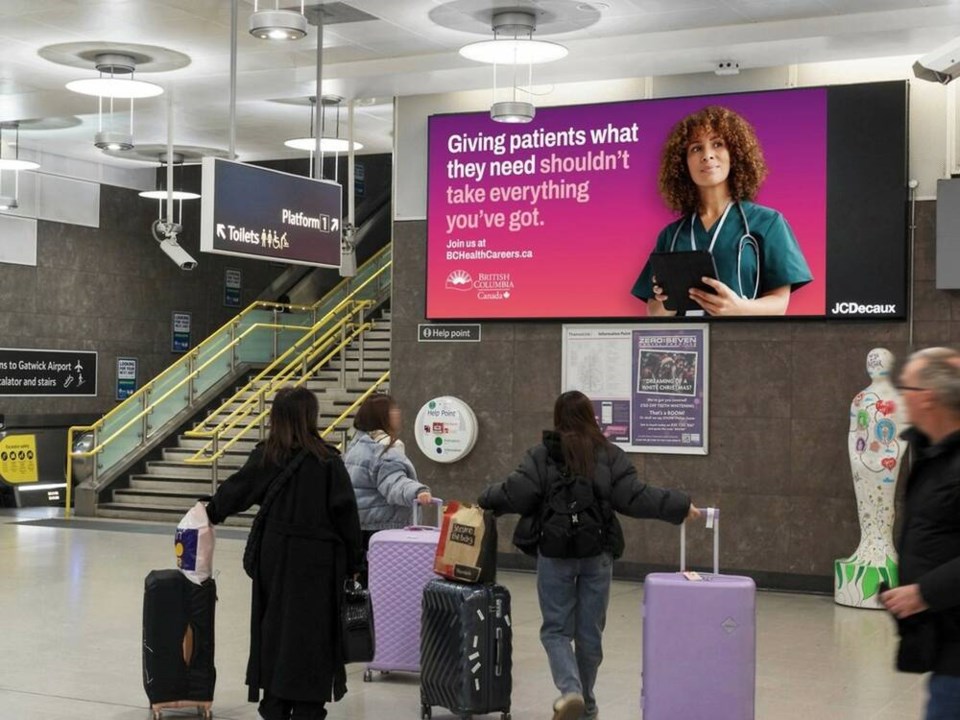The B.C. government is courting doctors and nurses in the United Kingdom, touting wages that are double what they’re making now.
However, a B.C.-based physician recruiter said this province remains one of the hardest places for internationally trained doctors to get into, which is frustrating for them and British Columbians without access to one.
Those riding the Tube in London or buses in Glasgow might notice Government of B.C. advertisements that read: “Providing care for families should allow you to provide for yours” or “A better deal for family doctors, more time for patients.”
The ads include a link to a health recruitment website that features a video depicting a float plane soaring over forested mountains and a kite surfer gliding across the ocean.
The ad campaign comes as thousands of doctors have gone on strike against England’s National Health Service in recent weeks calling for higher wages and better working conditions.
NHS doctors, for example, are paid a basic starting salary equivalent to $55,000, the entry-level salary for those doing their medical residency, ranging up to $170,500 for someone with about 28 years experience.
B.C. in 2022 negotiated a new physician payment agreement that means a full-time family physician working 1,680 hours a year, who handles 1,250 patients, will earn at least $385,000.
Doctors interviewed by British media during the strike said their wages are about half that of equivalent physicians in Canada or the U.S, which is why many are leaving the U.K.
Asked about the ad campaign during an unrelated press conference on Monday, Premier David Eby said he reached an agreement with fellow premiers that “we’re not going to try to poach people from other provinces across Canada — we didn’t make that commitment to the government of the U.K.”
“If the government of the U.K. is not recognizing what they have in terms of the amazing skilled professionals that are there, by not compensating them properly, not treating them with respect, then they should come to British Columbia,” he said.
British doctors will “feel very at home here,” Eby said, touting the double-decker buses in Victoria.
“I personally would like to welcome them at the airport and thank them for their contributions to our health-care system,” he said.
Phil Martin, who runs a physician recruitment company called Physicians For You, said he wishes it was as easy as jumping on a plane and arriving at Vancouver International Airport.
Canada is the hardest country for internationally trained doctors to get into, he said, and “B.C. is the hardest [province] in Canada.”
“Unless a doctor really wants to come to B.C., it’s easier to go elsewhere,” said Martin, who is based in the Okanagan and has worked in recruitment for 18 years. “They can go to Manitoba or Ontario now without supervision, without an exam, and still practise independently.”
“Doctors get so frustrated with all the challenges,” he said, noting it takes about a year for general practitioners to become licensed to practise in Canada or 18 months for a specialist, compared to about six months in Australia. “I had one doctor say to me, ‘It’s like they’re almost trying to keep us out.’”
Martin, who has worked in the U.K. and Australia before moving to Canada, said B.C. is losing talented doctors to countries like Australia because the accreditation process there is much easier.
He said the B.C. NDP’s announcement in 2022 that it would loosen restrictions on foreign-trained doctors hasn’t made enough of a difference in removing the bureaucratic hurdles.
“B.C. is still behind everyone else,” he said.
The government tripled the yearly intake — 32 to 96 — of internationally trained doctors that can become licensed in B.C. through the practice ready assessment program. Internationally trained doctors not eligible for that program can become associate physicians, doctors that work for a period of time under the supervision of a B.C. doctor.
Despite these changes, Rosemary Pawliuk, president of the Society of Canadians Studying Abroad, said “the significant roadblocks have not been removed.”
The fact that the government is courting U.K. doctors while not making it any easier for Canadians who study medicine abroad to practise medicine here is “a slap in the face to these [Canadians],” said Pawliuk, a lawyer from Metro Vancouver.
She was speaking from Honolulu, where her daughter, Dr. Alexandra Brito, practises medicine. Brito completed her medical degree in Ireland and, despite achieving top marks, could not get a residency placement in Canada and as a result, completed her residency in the U.S.
“We’re saying we don’t have enough doctors when there are literally thousands of Canadians who — with reasonable assessment of competence rather than these tricky little barriers — would be happy to come home,” Pawliuk said.
Eby said medical residency spaces in B.C. are limited — for example to 186 a year for family medicine — and priority is given to those who study medicine in Canada.
“This is an ongoing concern, I know, for people who have done training in other places,” he said, saying that is why the government has expanded the number of residency places available to internationally trained medical graduates.
Currently, the University of British Columbia has 52 residency positions for international medical graduates in family medicine and six residency positions in general specialty positions.
The Ministry of Health said 768 international medical graduates have been registered in the province between Jan. 1, 2023, and Feb. 1, 2024.



